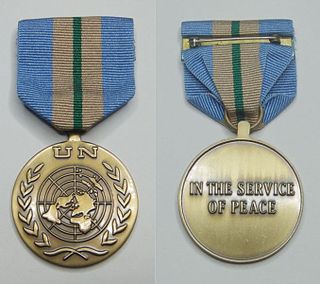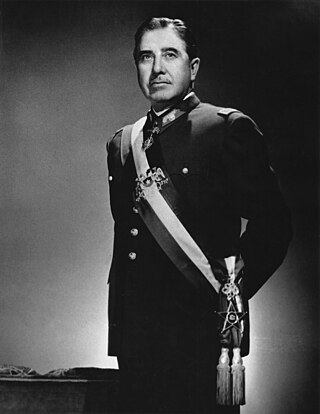Related Research Articles

The North Atlantic Treaty Organization, also called the North Atlantic Alliance, is an intergovernmental military alliance of 32 member states—30 European and 2 North American. Established in the aftermath of World War II, the organization implements the North Atlantic Treaty, signed in Washington, D.C., on 4 April 1949. NATO is a collective security system: its independent member states agree to defend each other against attacks by third parties. During the Cold War, NATO operated as a check on the threat posed by the Soviet Union. The alliance remained in place after the dissolution of the Soviet Union and the Warsaw Pact, and has been involved in military operations in the Balkans, the Middle East, South Asia and Africa. The organization's motto is animus in consulendo liber. The organization's strategic concepts include deterrence.

The Canadian Armed Forces are the unified military forces of Canada, including land, sea, and air commands referred to as the Canadian Army, Royal Canadian Navy, and the Royal Canadian Air Force. The CAF also operates several other commands, including the Canadian Forces Intelligence Command, the Canadian Joint Operations Command, and the Canadian Special Operations Forces Command. Personnel may belong to either the Regular Force or the Reserve Force, which has four sub-components: the Primary Reserve, Supplementary Reserve, Cadet Organizations Administration and Training Service, and the Canadian Rangers. Under the National Defence Act, the Canadian Armed Forces are an entity separate and distinct from the Department of National Defence, which also exists as the civilian support system for the forces.

The Junkers Ju 52/3m is a transport aircraft that was designed and manufactured by German aviation company Junkers. First introduced during 1930 as a civilian airliner, it was adapted into a military transport aircraft by Germany's Nazi regime, who exercised power over the company, for its war efforts over the objections of the company's founder Hugo Junkers.

Froot Loops is a sweetened, fruit-flavored breakfast cereal made by WK Kellogg Co for the United States, Canadian, and Caribbean markets and Kellanova for the rest of the world. The brand was solely owned by the original Kellogg Company before it spun off its North American cereal division as WK Kellogg Co in late 2023. The fruit-flavored cereal pieces are ring-shaped, with a variety of bright colors.

Operation Jubilee or the Dieppe Raid was a disastrous Allied amphibious attack on the German-occupied port of Dieppe in northern France, during the Second World War. Over 6,050 infantry, predominantly Canadian, supported by a regiment of tanks, were put ashore from a naval force operating under protection of Royal Air Force (RAF) fighters.

Shearwater Heliport, formerly known as Canadian Forces Base Shearwater and commonly referred to as CFB Shearwater and formerly named HMCS Shearwater, is a Canadian Forces facility located 4.5 nautical miles east southeast of Shearwater, Nova Scotia, on the eastern shore of Halifax Harbour in the Halifax Regional Municipality. Following a base rationalization program in the mid-1990s, the Canadian Forces closed CFB Shearwater as a separate Canadian Forces base and realigned the property's various facilities into CFB Halifax. These include:

The channel-billed toucan is a near-passerine bird in the family Ramphastidae found on the Caribbean island of Trinidad and in tropical South America as far south as southern Brazil and central Bolivia.

A United Nations Medal is an international decoration awarded by the United Nations (UN) to the various world countries members for participation in joint international military and police operations such as peacekeeping, humanitarian efforts, and disaster relief. The medal is ranked in militaries and police forces as a service medal. The United Nations awarded its first medal during the Korean War (1950–1953). Since 1955, many additional United Nations medals have been created and awarded for participation in various United Nations missions and actions around the world.

The keel-billed toucan, also known as sulfur-breasted toucan, keel toucan, or rainbow-billed toucan, is a colorful Latin American member of the toucan family. It is the national bird of Belize. The species is found in tropical jungles from southern Mexico to Ecuador. It is an omnivorous forest bird that feeds on fruits, seeds, insects, invertebrates, lizards, snakes, and small birds and their eggs.

The International Force East Timor (INTERFET) was a multinational non-United Nations peacemaking task force, organised and led by Australia in accordance with United Nations resolutions to address the humanitarian and security crisis that took place in East Timor from 1999–2000 until the arrival of UN peacekeepers. INTERFET was commanded by an Australian military officer, Major General Peter Cosgrove.

Operation TOUCAN was a KGB/DGI public relations and disinformation campaign directed at the military government of Chile led by Augusto Pinochet, particularly the Dirección de Inteligencia Nacional (DINA). The plot's twofold task was to organize sympathetic human rights activists to pressure the United Nations and generate negative press for the Pinochet regime. According to former KGB officer Vasili Mitrokhin, the plot was originally conceived by Yuri Vladimirovich Andropov. It was approved on August 10, 1976.

5 Combat Engineer Regiment is a regular combat engineer unit of the Canadian Forces stationed at Canadian Forces Base Valcartier in Quebec. 5 CER is the only Canadian combat engineer regiment operating in French. The mission of 5 CER is to provide combat engineer support to the formation or task force created by 5 Canadian Mechanized Brigade Group.

Operation Friction was a Canadian military operation that saw the contribution of 4,500 Canadian Forces personnel to the 1991 Gulf War. The larger US components were Operation Desert Shield and Operation Desert Storm.

Operation Overlord was the codename for the Battle of Normandy, the Allied operation that launched the successful liberation of German-occupied Western Europe during World War II. The operation was launched on 6 June 1944 (D-Day) with the Normandy landings. A 1,200-plane airborne assault preceded an amphibious assault involving more than 5,000 vessels. Nearly 160,000 troops crossed the English Channel on 6 June, and more than two million Allied troops were in France by the end of August.

USS Toucan (AM-387) was an Auk-class minesweeper acquired by the United States Navy for the dangerous task of removing mines from minefields laid in the water to prevent ships from passing. She was the only U.S. Navy ship named for the toucan, a brightly colored and easily tamed bird of the American tropics, characterized by its large but thin beak.

Toucans are Neotropical members of the near passerine bird family Ramphastidae. The Ramphastidae are most closely related to the American barbets. They are brightly marked and have large, often colorful bills. The family includes five genera and over 40 different species.

436 Transport Squadron is a unit of the Royal Canadian Air Force. It currently operates the CC-130J Super Hercules from 8 Wing Trenton in Trenton, Ontario.
Operation Laser is a domestic operation of the Canadian Armed Forces for contingency planning and response in the event of a pandemic. Its three goals are: protecting CAF personnel and capability, assessing CAF capabilities to respond to a pandemic, and assisting other government departments in the event of a pandemic.
References
- ↑ Defence, National (2013-11-05). "Operation TOUCAN". www.canada.ca. Retrieved 2024-06-02.